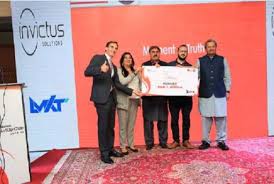Peshawar team wins Rs 1 million in StartUp Cup

Islamabad: Entrepreneurs can change the way we live and work. Their innovations often improve our standard of living. Their entrepreneurial ventures create wealth and also jobs, as well as the conditions for a prosperous society.
This is the reason the U.S. Embassy partnered with the youth of Pakistan in StartUp Cup, a competition in which Pakistani entrepreneurs compete for support for their business ideas.
During the finals of the fifth annual StartUp Cup business model competition, a team from Peshawar prevailed over 17 other teams to take the top prize – one million Pakistani rupees. Nano IT developed a startup plan to develop an educational immersive virtual reality product and will use the prize money as seed funding for their company.
DeafTawk from Islamabad took home second prize for its product providing sign language services for the deaf community through online video platforms and won 750,000 rupees. Third-place was shared between ReceiptBox from Karachi and Aprus from Peshawar.
Speaking at the closing ceremony, Ambassador Paul Jones, Chargé d’Affaires a.i. at the U.S. Embassy, congratulated all the winners: “Your startups have the opportunity to change the future and drive innovation, improving the lives of people in Pakistan and across the world. The United States will continue to partner with you, Pakistan’s aspiring entrepreneurs, to help achieve your dreams because we understand the importance of your vital work.”
The IndUS Entrepreneurs (TiE) Islamabad Chapter President Sarah Hashwani stated: “It has been a remarkable journey. The young people we get to meet inspire us. I want to thank all of those who have come forward over the years, taken the leap of faith, and have had the courage to take use this chance to launch a new business venture.”
For this year’s competition, TiE Islamabad Chapter reviewed more than 1,500 business ideas from across the country and selected 680 teams to participate in six months of StartUp Cup training and activities. These activities included workshops, mentoring opportunities, and judging sessions in Islamabad, Lahore, Karachi, Faisalabad, Peshawar, and Quetta. The regional competitions selected 18 finalists to compete in the Islamabad finals.





